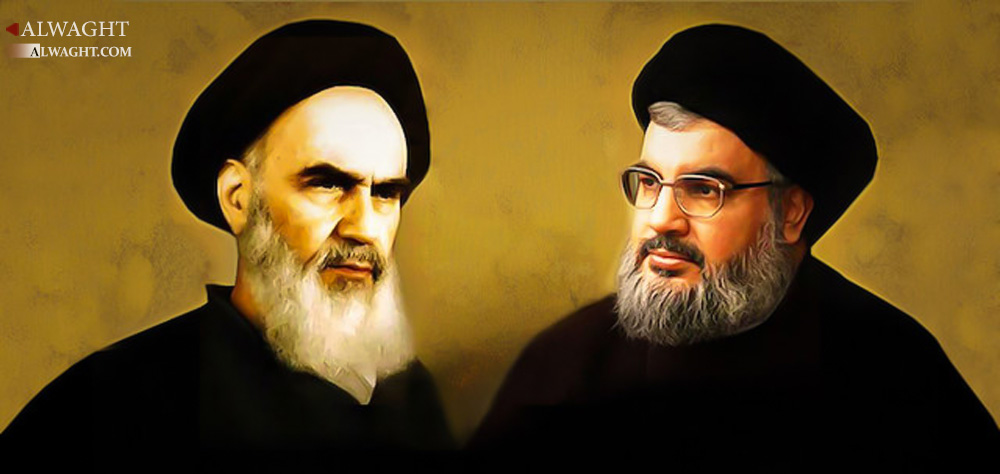With its struggle against oppression and arrogant powers, the victory of the Islamic Revolution in Iran provided support for the underprivileged groups and defended their rights against the oppressors and the aggressors which led to Iran’s unwavering support of Hezbollah in Lebanon and the sacred cause of Palestine in their fight against the ravenousness of the Zionist entity.
The Islamic Revolution in Iran achieved its victory at a time when the dishonorable Camp David Accords was being signed and as the Israeli entity prepared to invade Lebanon as well. This caused Imam Khomeini’s guidelines and firm stances to result in fighting back Israel in a new method.
The Islamic Republic of Iran provided self-confidence to Resistance fighters in Lebanon who later became known as Hezbollah while also supporting the people of Palestine. Imam Khomeini then became the precursor of the revolutionary movement for inviting the world to support the oppressed people of Lebanon and Palestine spiritually and materially.
The Islamic Revolution in Iran made the resistance understand that their victory is dependent upon following the path of Imam Khomeini. And that was evident in the open letter program of Hezbollah.
In the Hezbollah’s worldview: “aggression can be repelled only with the sacrifice of blood, and freedom is not given but regained with the sacrifice of both heart and soul.” Such an ideology came to be at a time when Iran’s revolution had managed to become the first example of Islamic Awakening in the region.
Hezbollah leaders have time and again emphasized that their resistance against the Zionist occupation was inspired by the movement of Grand Ayatollah Ruhollah Khomeini and that Iran’s revolution was the best example for nations to follow in their path of fighting against oppression.
Hezbollah chief Sayyed Hassan Nasrallah in one of his televised speeches commemorating the demise anniversary of the Islamic Republic of Iran’s founder Ayatollah Khomeini described how the Islamic resistance in Lebanon was stimulated by the movement of the Imam: “Following the path of the Islamic Revolution, we managed to defeat the Zionist enemy that had occupied Lebanese lands for over a quarter of a century. The resistance movement forced the Zionist enemy out of Lebanon in 2000 by resorting to the line of Islam and the Quran.”
Sayyed Nasrallah also elaborated during the victory ceremony in Bint Jbeil in the year 2000 how the eminence of Imam Khomeini motivated the Lebanese youth to claim victory against the Zionist Entity:
“From among the aspects of the greatness of Imam Khomeini (may his soul be sanctified) is that he was a leader and an Imam. This great human was not an ordinary person nor was he a political leader in its ordinary sense. Imam Khomeini was a jurist and a religious authority, a mystic, a philosopher and thinker, a leader in the battle field, and one well aware of history and the message of Islam, and well aware of his contemporary time and his friends and enemies and the extent of their schemes. This historical Imam, this unique Imam, the Imam of revolutionaries is the leader of the soldiers of God and those who sacrifice. The exceptionality of Imam Khomeini was that he was, as martyr Mutahari had said, a believer in his Lord, in his people, and in the path that he was taking. Grand Ayatollah Khomeini presented the victory of the Islamic Revolution to all the weak and the oppressed, the tortured and the aggrieved in this world whether they were Muslim or non-Muslims. When our brothers visited him in 1982, he told them to fight their enemy in their country and turn Lebanon into a graveyard for the Zionist invaders. He told them to start from scratch, rely on God and not to wait for anyone in this world and to always keep in mind that they are definitely victorious!”
At a time when the logic of resistance was strange in Lebanon back then, at a time when the common sense was known to be that “the eye cannot resist a needle”, Imam Khomeini was giving orders for people to resist and could even see the flags of victory raised all around Bint Jbeil, Marja’youn and Hasbaya and the occupied villages in the occupied border strip.
Sayyed Nasrallah continued that: “From the very beginning, he encouraged us to fight for the sake of God, and showed us the way, filled our hearts with certainty and reliance of God, and gave us glad tidings of victory, and so victory came!”
Imam Khomeini saw the Lebanese and Palestinian youth as a source of pride for the Arab and Islamic Ummah (Nation). The Imam used to say and he indeed wrote way before Hezbollah’s victory in the year 2000 that the Jihad of these youths and the Jihad of this Resistance, will become a proof upon the Islamic world, and its scholars and elites. In the words of Sayyed Nasrallah, “At a time when many of us used to doubt the very essence of victory in Lebanon, Imam Khomeini saw with God’s eye that the resistance will be victorious and that its victory will become the proof and the model”.
The Islamic Revolution proved that preparing oppressed people against aggressors and restoring their rights was best done via the ideology presented by Ayatollah Imam Khomeini.
Today, the oppressed people of Lebanon who were inspired by the Islamic Revolution of Iran and formed Hezbollah, learned how to stand against and defeat the Zionist occupation forces and even become a regional power. They knew that the only way for their salvation was to put their trust and reliance in God, follow the mandates of the Holy Quran, and learn from the perspective of the late Imam Ayatollah Ruhollah Khomeini.
By Marwa Osman



























